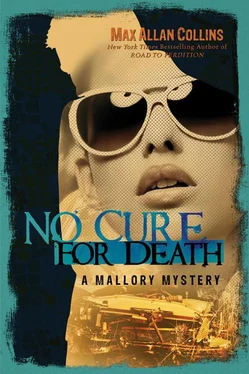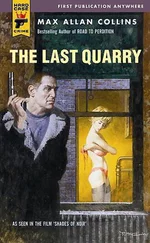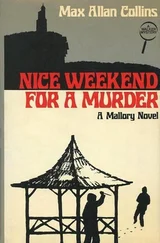Max Collins - No Cure for Death
Здесь есть возможность читать онлайн «Max Collins - No Cure for Death» весь текст электронной книги совершенно бесплатно (целиком полную версию без сокращений). В некоторых случаях можно слушать аудио, скачать через торрент в формате fb2 и присутствует краткое содержание. Год выпуска: 2012, Издательство: AmazonEncore, Жанр: Криминальный детектив, на английском языке. Описание произведения, (предисловие) а так же отзывы посетителей доступны на портале библиотеки ЛибКат.
- Название:No Cure for Death
- Автор:
- Издательство:AmazonEncore
- Жанр:
- Год:2012
- ISBN:нет данных
- Рейтинг книги:4 / 5. Голосов: 1
-
Избранное:Добавить в избранное
- Отзывы:
-
Ваша оценка:
- 80
- 1
- 2
- 3
- 4
- 5
No Cure for Death: краткое содержание, описание и аннотация
Предлагаем к чтению аннотацию, описание, краткое содержание или предисловие (зависит от того, что написал сам автор книги «No Cure for Death»). Если вы не нашли необходимую информацию о книге — напишите в комментариях, мы постараемся отыскать её.
No Cure for Death — читать онлайн бесплатно полную книгу (весь текст) целиком
Ниже представлен текст книги, разбитый по страницам. Система сохранения места последней прочитанной страницы, позволяет с удобством читать онлайн бесплатно книгу «No Cure for Death», без необходимости каждый раз заново искать на чём Вы остановились. Поставьте закладку, и сможете в любой момент перейти на страницу, на которой закончили чтение.
Интервал:
Закладка:
“Nothing.”
“I don’t believe you.”
“Who cares? Since when are you the cop?”
“Just trying to live up to your sterling example, Brennan.”
“All right, all right, he told me his wife and her mother didn’t get along. That his wife was kind of crazy, she was one of them split personality types, you know? She was all the time beating up on her kid, and on the mother, too.”
“And that’s why you’re not pursuing the angle about the mother being beaten up?”
“That’s as good a reason as any. You want a solution to the big mystery, don’t you? You feel you got to know the truth or you just can’t go on? Try this one out: the little Taber bitch beats her mother up, and then goes out to spend some time with a friend, and while she’s gone a fire starts up accidentally, so when she comes back the house is burning and her mother’s dying, trapped in there and beat up; the girl gets feeling low over what she done, and boozes it up and goes off the cliff.”
“No alcohol in the bloodstream, Brennan, remember?”
“Okay, so she was gonna go out drinking and had the bottle in the car with her. Still indicates the state of mind she was in, right? She was depressed and maybe a little suicidal and she drove off the cliff.”
“And that’s the way you see it?”
“No. I don’t see it no way. I see some dead people, some accident victims, nothing more, nothing less. No foul play apparent. No arson, either. Principal player dead. The end. Case closed.”
“You’re through investigating, then?”
“I never started.”
“She had a kid.”
“Who had a kid?”
“I told you about it before. Janet Taber had a kid. You just said she used to beat her kid, remember? He’s supposed to be in a clinic in the east waiting heart surgery. What about him?”
“He is his father’s concern.”
“Phil Taber, you mean.”
“That’s right. No worse off than a million other kids these days who gotta grow up with freaks for fathers.”
Lori came over from the sink, where she’d been rinsing off dishes, and said, “Mal? Can I talk to you for a moment?”
“Sure.” I looked at Brennan. “Excuse me, Sheriff.”
He puffed at his cigarette, said nothing.
Lori took me into the nursery, which was a small room about the size of a double closet, with blue plaster walls. The lights were off. Her little boy Jeff was sleeping in his crib, so she talked in whispers.
“Excuse me for eavesdropping,” she said, “but I heard what Brennan said about Janet. What he said Phil Taber said about Janet.”
“Oh?”
“Yes. Look I was talking on the phone this morning, with Annie Coe, about Janet….”
“Who’s Annie Coe?”
“Annie Coe’s a girl about my age Janet was hanging around with these months since she moved back to town. She’s divorced and she and Janet had a lot in common. Anyway, she’s the friend Janet was with that night, the night of the fire and everything.”
“And?”
“I don’t need Annie’s word for it to tell you that story about Janet being a split personality is a crock. I knew Janet well enough to peg that one as phony. And what Annie told me backs up my opinion. Annie said Janet and her mother had grown very close these past months. Janet felt her mother had really come through in time of need, you know? And though I never met Mrs. Ferris, Janet’s mother, I know from what Annie said this morning that it’s very unlikely Janet could have beaten up on her.”
“Why’s that, Lori?”
“You were with Janet, you know what she looked like. She wasn’t big. She was almost petite. It must’ve been her father she took after, from what Annie said. What Annie said was, probably the only reason the beating and the fire didn’t kill Mrs. Ferris right away was her size. Only reason she lasted most the night was that she was a big, healthy, fleshy woman. Stood close to six-foot. It’d take somebody good size to beat up that lady….”
EIGHTEEN
There was a moon tonight, or a slice of it, anyway, but it was up under some clouds that were rolling by like dark smoke. Despite the darkness, I could see the Norman house plainly. The grounds directly surrounding it were free of trees and brush and sloped gently, very gently up around the house, which was outlined stark against the sky, sitting back from the edge of a hill that fell sharply to the Mississippi. The river’s waters reflected what light there was back up against the smooth, unpainted cement walls of the Norman house.
It looked like a Moorish fortress or castle, as cut to scale and modified by a would-be Frank Lloyd Wright; something like some of the things put up in the thirties in California towns, only more so, and minus the stucco. The top floor sat on the bottom like a smaller box on a slightly larger one, with a one-story wing on either side; the roof was tower-cut, with fat, stubby turrets on every corner. In its original conception it had been a combination penthouse above and radio station below-the back wall still had the shadow where a giant radio antenna once climbed. The front wall, the face of the house standing watch over the river, had three irregular windows along the bottom floor, like odd teeth, and, on the upper floor, running near the house’s width, a long horizontal window looking out on the river like the viewscreen on a welder’s mask.
We had found the gate open, Rita and I, and had followed the narrow drive up to the house. The drive was bordered by thick dead brush and the occasional outstretching arms of a skeletal tree, all part of a thicket that served to isolate the Norman house and its sloping grounds, making it an island in the midst of a heavily populated section. That island was a part of the uneasy transition between downtown Port City and East Hill, with supermarket, filling station, hardware store and lumberyard just across the way, and on either side of the protective thicket were clusters of middle-class housing. The way to the gate of the Norman drive was via an alley bordered on either side by frame houses.
I got out of the car just before we cleared the thicket and turned the wheel over to Rita, let her drive up toward the house alone. I stayed back in the brush and watched her pull my Rambler into the open graveled area and park by the back door. There were no other cars in the parking area; opposite the house, across the graveled space, was an unpainted cement garage, built years ago for three cars, big enough now for two, at a slant.
About the time Rita would have been taking her keys out of the ignition, the back door to the house opened, and in the light it let out I saw a big black man come out and rush over to help her out of the car. He was wearing a well-tailored, well-cut houndstooth suit, with a white shirt, open at the collar, and he wore a black eyepatch where a left eye had been.
Harold Washington.
We’d met before.
He and Rita embraced, and with an arm around each other’s waist, they went inside.
I approached the house carefully, staying within the confines of the thicket, and moved slowly around until I reached the point where the brush met the slope of the hill that dropped to the river. I crouched and stared at the building for something like five minutes, then crawled up by a slant-roofed wing, edged around it and went in through the same door as Rita and her brother.
I’d managed to get the layout of the house from Rita, so I wasn’t worried about finding my way around. The door to her brother’s living quarters was to my right and tight-shut, though soft sounds of conversation were seeping out. The game plan I’d outlined to Rita was that she would talk to Harold for half an hour, brother-sister small talk, and then break it to him she’d brought somebody along to see him. I had something else in mind, though, which necessitated a mild double cross.
Читать дальшеИнтервал:
Закладка:
Похожие книги на «No Cure for Death»
Представляем Вашему вниманию похожие книги на «No Cure for Death» списком для выбора. Мы отобрали схожую по названию и смыслу литературу в надежде предоставить читателям больше вариантов отыскать новые, интересные, ещё непрочитанные произведения.
Обсуждение, отзывы о книге «No Cure for Death» и просто собственные мнения читателей. Оставьте ваши комментарии, напишите, что Вы думаете о произведении, его смысле или главных героях. Укажите что конкретно понравилось, а что нет, и почему Вы так считаете.












